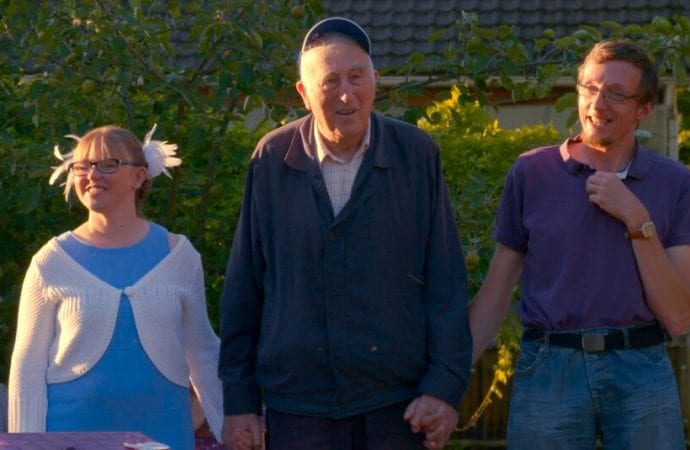Theoretically, all baptized Catholics are supposed to strive for sanctity. If you’re like most of us, however, you rarely meet someone who just seems to radiate holiness - not a faux saccharine piety, but the real deal. We’re talking about the sort of personality with whom, after an encounter, you walk away thinking, “I just saw a living saint.”
20th century Catholicism bred a handful of such figures, among whom both Mother Teresa and Jean Vanier figured especially prominently - making it apt, perhaps, that Vanier died on the very day Pope Francis is in North Macedonia paying tribute to the feisty “saint of the gutters” with whom Vanier was so often compared, and paired, in life.
Vanier, who was 90, died from cancer Tuesday morning in a facility in Paris run by the L’Arche community that he founded in 1964. Upon hearing the news, Francis released a brief statement through a spokesman saying he’s “praying for [Vanier] and for the entire L’Arche community.”
By the time I arrived on the Vatican scene in the late 1990s, Vanier was already a fixture on the global Catholic scene, famed for his outreach to people with physical, mental and emotional disorders. His idea was not to treat such people as the objects of charity, but rather as friends and even teachers, founding communities in which they lived alongside people without disabilities in a spirit of mutual respect and care.
I remember distinctly the first time I came face-to-face with Vanier, which was during a Vatican news conference in the run-up to the Great Jubilee Year of 2000. He’d been asked to speak on a panel about some papal initiative, and for much of the discussion, to be honest, he didn’t seem especially dialed in.
Yet when I asked Vanier if Pope John Paul II had become a more powerful symbol for the people he lived and worked with because the aging pontiff was himself, in a sense, “disabled,” Vanier lit up.
His response was simple and unequivocal: “The pope has never been more beautiful than he is right now,” he said, and then explained how what the world often sees as weakness and embarrassment can, seen through different eyes, often reveal itself as a tremendous gift.
It’s hard to describe now, but the sincerity and conviction with which he spoke was electric, and by the time he was done, I was sold.
Vanier was born in 1928 in Geneva to Canadian parents, and went to study in Canada, England and France. In 1945, he visited his father in Paris who was then serving as the Canadian Ambassador to France, where he saw first-hand the horrors of the Holocaust as he and his mother volunteered to assist concentration camp survivors.
Vanier earned a Ph.D. in Philosophy from the Institut Catholique de Paris in the mid-1960s with a dissertation on happiness in Aristotle, and, at that stage, he saw a scholarly career stretching ahead. Moved by a desire to do “something else,” however, he abandoned academia.
Through friendship with a French priest, Vanier became aware of people suffering from disabilities and invited a couple of other friends to come live with him and a handful of disabled persons in Trosly-Breuil, France, thereby launching the L’Arche movement.
In 1971, Vanier also co-founded the Faith and Light movement, focused on people with learning disabilities. L’Arche has spread to more than 37 countries, and Faith and Light to roughly 80.
Over the years, Vanier has received virtually every honor and distinction to which any humanitarian could aspire, including the Companion and Order of Canada, the French Legion of Honor, the Pacem in Terris Peace and Freedom Award, and the Templeton Prize. Vanier’s life, and the community he founded, were chronicled in the 2017 film Summer in the Forest.
Undoubtedly, however, Vanier would say he was less interested in prizes and recognition than in the various ways his community’s spirit took root around the world.
Henri Nouwen is one good example. The famed Catholic priest and writer met Vanier while Nouwen was teaching at Harvard in the mid-1980s, and a friendship blossomed. Vanier invited Nouwen to join him at Trosly-Breuil, where Nouwen discovered a new sense of purpose. He eventually moved into a L’Arche center in Ontario in 1986, where he became its pastor for the last decade of his life.
While in Ontario, Nouwen became close to a man named Adam Arnett, who had several developmental disabilities. Nouwen always insisted that he, not Arnett, got the most out of their relationship, and he’d eventually write about the experience in the 1997 book Adam: God’s Beloved.
There’s another layer to the story, because while Nouwen was discovering Vanier and L’Arche at Harvard he was also teaching a deeply thoughtful young Ukrainian Greek-Catholic priest by the name of Borys Gudziak.
A decade later, Gudziak would be tasked with rebuilding a genuinely Catholic University in Ukraine after the fall of communism, and he began with a diagnosis: That the Ukrainian people were suffering from a profound “trust deficit,” after seven decades of being programmed during the Soviet era to lie, conceal, and hide their true selves.
To remedy that trust deficit, Gudziak turned to Nouwen, Vanier and L’Arche, inviting mentally handicapped people to become part of the university community. At the Ukrainian Catholic University, the mentally handicapped actually serve as “professors of human relations.”
“This is not some kind of handout,” Gudziak told me in 2012. “We need the gifts they have. They don’t care if you’re a rector, a doctor, or how rich you are. What they force us to confront is the most important pedagogical question of all: Can you love me?”
If one measure of a life is the way it shapes others, then Vanier’s living legacy in such unlikely venues as Ukraine suggests that his life was a prodigy indeed. Requiescat in pace, Jean Vanier.

